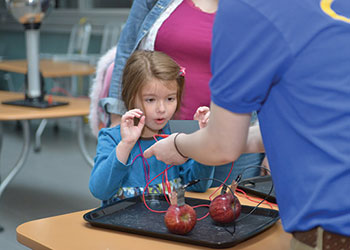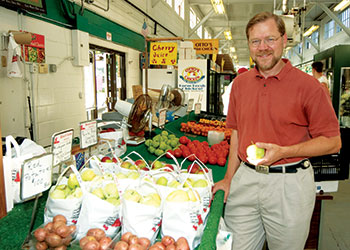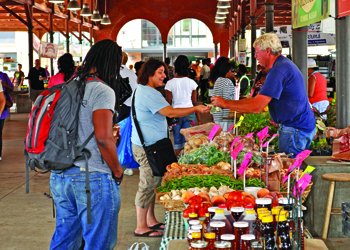Making a STEM Connection
"We connect scientists with the public, professionals with other professionals, and disciplines with other disciplines. Most importantly, we connect STEM with everyday life."
January 26, 2016
Imagine what would happen if science was taken out of the laboratory, put on display, and explained by a professional, passionate about sharing the wonder and excitement of a science career.
This is the MSU Science Festival: a celebration of science, technology, engineering and mathematics (STEM) that gets everyone involved and inspired.
“We make connections,” says Renee Leone, coordinator and co-founder of the MSU Science Festival. “We connect scientists with the public, professionals with other professionals, and disciplines with other disciplines. We connect people with educators, mentors and career options. We connect STEM with everyday life.”
The Science Festival happens, in large part, thanks to sponsors. “Sponsors make everything possible,” Leone says. “They’re the reason the festival has grown so much and will continue to grow. Most importantly, they’re the reason we’re able to make every single event free of charge.”
Media partners like the Lansing State Journal and local TV stations help get the word out about the festival. Some partners contributes goods. Dean Transportation and CATA provide free rides between venues. Sponsors help offset costs for running the festival.
Some corporations take their sponsorship a step further by bringing in display booths of their own as a way to showcase their STEM career opportunities and bring awareness to their work.
One such company is Johnson Controls, which specializes in battery optimization and efficient electrical systems. At the 2015 festival, visitors could learn about generating electricity with unconventional materials like fruit, vegetables and various metals. The seemingly simple experiment demonstrated that a STEM career offers boundless opportunities to experiment, invent and innovate.
Every year, Leone and her team review surveys from those who attended. More than half report being “somewhat interested” in STEM before the festival, but leave with a heightened interest.
Visitors might be curious college students, parents wondering how to foster a child’s interest in science, or children having their first opportunity to engage with a science professional or discover an untapped love for STEM.
“There may be no better way to understand your world than by having an understanding of science,” Leone says, “because it makes you an active participant. You can see that life is happening around you, rather than feel like life is only happening to you.”
As the emphasis on STEM grows, the movement to make science and technology more accessible has gained traction around the world. Leone’s inspiration came from a visit to UK, where she saw how the Cambridge University Science Festival sparked conversation and curiosity in its visitors.
Now, MSU and more than 40 others in the Science Festival Alliance across the U.S. and Canada collaborate to bring the best science and technology offerings to their communities each year.
MSU’s 2013 inaugural Science Festival attracted 10,000 people. In both 2014 and 2015, it brought in more than twice that number. The festival’s physical presence has grown, too. Initially concentrated on campus and venues around Lansing, the 2015 festival expanded to Detroit for a day, with help from the MSU Detroit Center.
It featured events at the Charles Wright Museum of African American History, the Scarab Club and the Michigan Science Center in Downtown Detroit. Visitors could choose to attend sessions in topics ranging from genomics to vehicle technology to inspiring stories of African Americans who have made great contributions to science. Detroit Day was so successful that an entire week of Detroit events has been added to the 2016 lineup.
Five years from now? “We want the MSU Science Festival to be statewide,” Leone says, “and this state, with its large network of museums and universities, is equipped for it.”
The 2016 MSU Science Festival will take place April 12-16 on MSU’s campus, April 18-24 in Detroit, and will have a statewide astronomy night on April 15.




